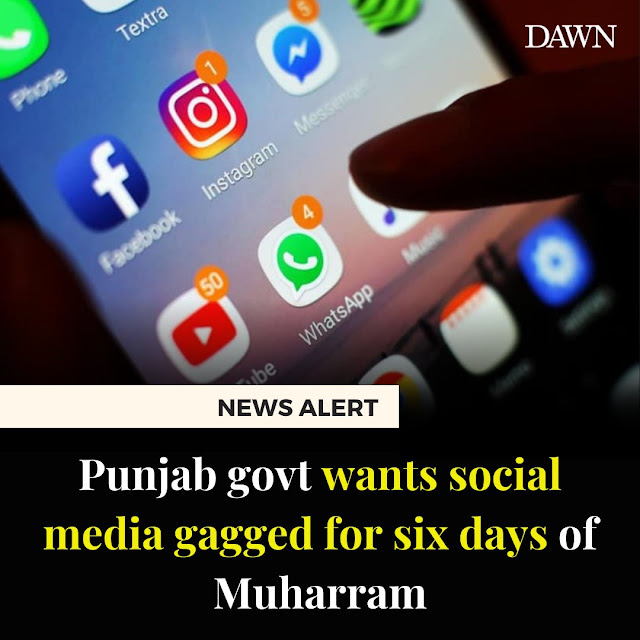Punjab govt wants social media gagged for six days of Muharram:
In an effort to control and maintain law&order in the province during (which calls for need of extreme vigilance), Punjab has moved to temporarily ban social media platforms over a span on 6 days. The move for the first ten days of Muharram is a part of efforts by the provincial government to counter hate speech and maintain peace.
Muharram is the first month of Islamic calendar, and it carries a significant value for Muslims all around the globe. Significance of the first 10 days, a highly important day being 'Ashura' which mourns the martyrdom of Prophet Muhammad's (pbuh) grandson Imam Hussain at Battle of Karbala. During these days - especially in Pakistan, where religious gatherings and mourning processions are taken out across the country to commemorate the sacrifice made by Martyrs; as a result there is always a fear of target killing due to fitna like TTP (Tehreek-e-Taliban-Pakistan) who could attack at any point.
The Punjab government effectively argues that silencing social media is necessary to stymie the reach of content online which may incite unrest. Social media, on one hand empowers people to express and communicate while it also gets abused by miscreants who spread hate speak should demolishing information - all the more predominantly during sensitive hours. The government is banning these platforms so that no provocative and communally sensitive content spreads on social media.
The move set off a wide variety of responses. Proponents say it is necessary to allow police and security forces some latitude in trying to keep the peace on Sunni-Shiite faultlines that run through a country where sectarian tensions can detonate with little notice. They are indicating towards previous examples of how social media is misused to exacerbate sectarian hate, leading in turn to violence and loss of life. For them, the transient kind of disruption is a small sacrifice in support of society at large ultimately achieving peace.
Critics of the ban, however, have voiced their concerns on freedom of expression and right to information. In addition to personal expression, social media platforms are now key information Discoverers. They say that such a blanket ban could be counter-productive as it may prevent access to vital information, particularly in an emergency. The same could also give rise to concerns surrounding the government's larger strategy vis-a-vis regulating all online content and potential overreach.
All of the above-mentioned fears can be taken care of only if the government ensures that it is indeed a temporary ban and restricts itself to just permitting such activities for this time frame as mentioned in basic premise 3. If its going to be applied transparently and communicated clearly why the ban was enforced, what it is expected do (less polltion) then some of this bad press can also come down. It also pops up as there probably are better ways to monitor and handle online content - in a more dispirited way, possibly misinforming cooperation with companies such that harmful contents can be removed more swiftly on occasion could lead to fairer trails.
In conclusion, imposition of social media blackout in first 10 days of Muharram within the confines of Punjab is simply a precautionary measure to avoid any kind incident which could provoke sectarian violence and slap on public safety. Its proponents and detractors will surely continue to argue over whether it is a good or bad idea, but the secret of its success lies in how well thought out the plan was, as well as for showing restraint in making this work with minimal interference while preserving our fundamental rights.



